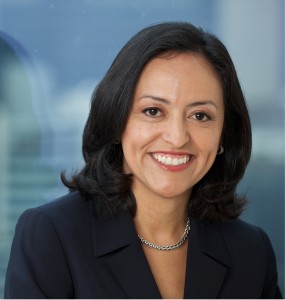 By Robin Madell (San Francisco)
By Robin Madell (San Francisco)
Three percent. That dismal number reflects the number of overall board seats held by women of color directors among Fortune 500 companies in 2011, according to Catalyst’s latest study on Women on Boards.
We may have grown weary of seeing numbers under 20 percent for women’s total board membership—in the United States, the latest figure is 16.1 percent, with the vast majority of countries studied posting even lower numbers. Yet when we scrutinize the data still further, we see that most board seats in women’s too-small slice of the pie—13.1 percent—are held by white women.
In fact, Catalyst’s research shows that when we look at individual companies, almost 71 percent have zero women of color directors serving on their board. Asian women and Latinas are particularly underrepresented when we examine the data for all women directors, holding only 2.5 percent and 4.9 percent of seats, respectively. Black women account for only 11.3 percent of all women directors.
How can we change this situation? Beth Stewart, CEO of Trewstar, which specializes in the placement of women on boards, says that companies need to make adding minority women to boards a specific priority. She explains, “This means that when they come up with a long list of very specific criteria, they need to choose race as the determining factor and not, for instance, supply chain management experience in China. Find that in the next white guy, and accept any type of high level business experience from a minority candidate.”
Stewart emphasizes that this does not mean lowering the criteria, but broadening it. “For example, if you were looking for someone who was a CFO and you find someone who is EVP for Technology, take the EVP for Tech and find the finance person in some other form—or add two directors,” says Stewart.
Other organizations, like the Robert Toigo Foundation, are also hard at work on the problem. Among Toigo’s initiatives is All A Board, a program for connecting boards with diverse candidates.
The program allows women and minority professionals interested in board service to use a free online tool to designate areas of interest and showcase their areas of expertise. The Toigo team uses these profiles to help connect board candidates with public and private companies, nonprofits, and foundations that are looking for leadership talent.
Nancy Sims, president of the Robert Toigo Foundation, also provided advice on what minority and multicultural women can do to improve their chances of landing a board seat—and what companies can do to help facilitate their efforts.
“The pipeline is growing,” says Sims. “But there is more to be done to both prepare women and minorities for board service—and to prepare boards for a change of composition. Creating a bigger supply, or pool of talent, without prompting an increased demand for the talent is only half of a solution. We need both the supply and the demand to expand for greater board diversity to occur.”
 According to Maria Castañón Moats, Chief Diversity Officer at PwC, simply acknowledging diversity isn’t enough to unlock its benefits – companies must engage with diversity to really experience its value. “I’m getting out there and talking to different people in practice about why it’s important for us to engage with each other when it comes to diversity,” she said.
According to Maria Castañón Moats, Chief Diversity Officer at PwC, simply acknowledging diversity isn’t enough to unlock its benefits – companies must engage with diversity to really experience its value. “I’m getting out there and talking to different people in practice about why it’s important for us to engage with each other when it comes to diversity,” she said.
 Contributed by Kelly Cepeda
Contributed by Kelly Cepeda By Melissa J. Anderson (New York City)
By Melissa J. Anderson (New York City) By Melissa J. Anderson (New York City)
By Melissa J. Anderson (New York City) By Melissa J. Anderson (New York City)
By Melissa J. Anderson (New York City) By Tina Vasquez (Los Angeles)
By Tina Vasquez (Los Angeles) By Robin Madell (San Francisco)
By Robin Madell (San Francisco) By Robin Madell, San Francisco
By Robin Madell, San Francisco By Melissa J. Anderson (New York City)
By Melissa J. Anderson (New York City)